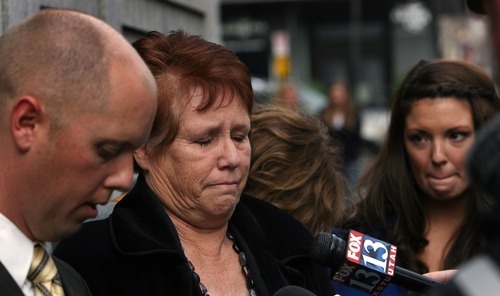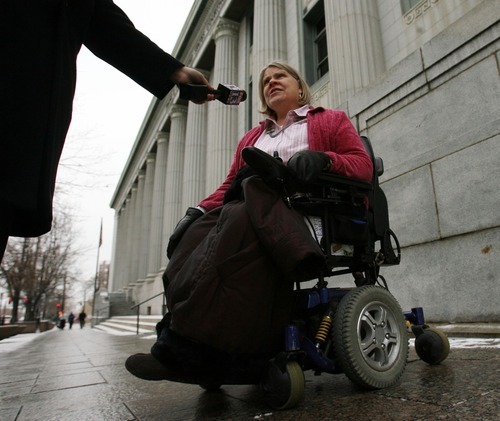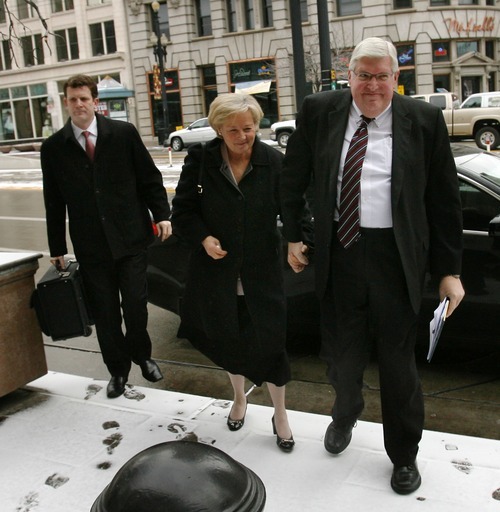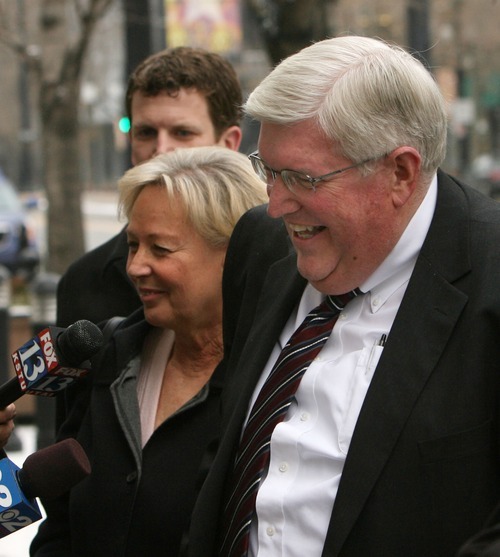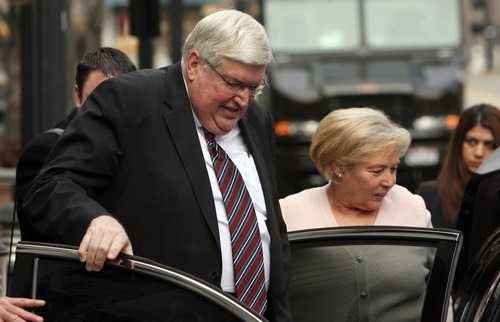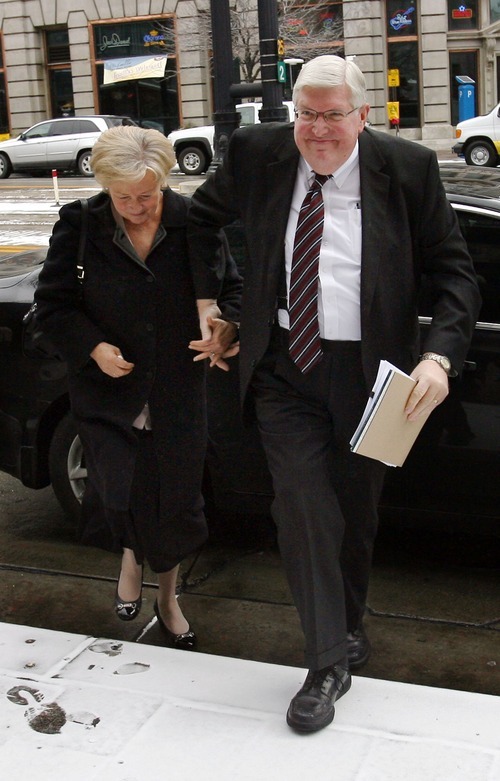This is an archived article that was published on sltrib.com in 2011, and information in the article may be outdated. It is provided only for personal research purposes and may not be reprinted.
For weeks, Garrett Wirick and his family quietly seethed as congressmen and community leaders lobbied for leniency in the case of Dewey C. MacKay.
The 244 letters of support sent to U.S. District Court Judge Dee Benson before MacKay's Monday sentencing all offered similar pleas: The Brigham City orthopedic surgeon had been convicted of illegally distributing painkillers, but couldn't the judge somehow overlook those transgressions in light of MacKay's civic record?
MacKay, after all, had served in the U.S. Army. He was the team physician for the local high school. He volunteered with the Boy Scouts of America and was a devoted member of The Church of Jesus Christ of Latter-day Saints.
Lost in the campaign to promote MacKay's character, Wirick said Monday in a standing-room only courtroom, are the victims whose lives MacKay destroyed by carelessly prescribing prescription medication, including Wirick's father, who died in 2006. The 55-year-old rocket scientist at Alliant Techsystems died of an overdose during a three-day binge after filling prescriptions from MacKay.
"I will never speak to him again in this life," said Wirick, turning toward MacKay. "I believe you have breached the trust that was placed in you as a physician."
Wirick's words came prior to Benson begrudgingly handing down a 20-year prison sentence — the mandatory minimum under law — to the 64-year-old at a three-hour hearing.
Benson said the case has raised questions over a doctor's responsibility to police their patients. Benson denied a request for restitution from MacKay's victims, saying prosecutors hadn't adequately linked the victims' medical problems to MacKay. Many patients, Benson argued, hadn't been open with MacKay about their dependency and addiction issues. With patients being dishonest with MacKay in order to feed their drug habits, the line for doctors between prescribing drugs for pain management and supporting a patient's drug addiction is an ethics issue that is difficult to answer , Benson said.
Ultimately, Benson ordered the prison sentence that aligned with the August verdict reached by a jury following a four-week trial. Jurors convicted MacKay of two counts of distribution of a controlled substance resulting in death, three counts of use of a communication facility in a drug trafficking offense, and 35 counts of distribution of a controlled substance. The doctor was acquitted of 44 other distribution counts.
"It's too long," Benson said of the sentence. "Congress is imposing this law, not me. I do like my job, but I don't like it today."
Before receiving his sentence, an unapologetic MacKay said he doesn't believe he is responsible for his patients' drug problems, even though he empathizes with pain their families have experienced as a result of addiction.
In a sermon-like speech where MacKay mentioned that he believes he'll be vindicated in the afterlife when "standing before the greatest of all judges", MacKay criticized the jury that convicted him, alleging that jurors — and society—don't understand chronic pain it is managed. He said he believes jurors at his trial tried their best, but that he is bewildered by their verdict.
"I know with all my heart they are mistaken in their verdict," MacKay said, adding, "I believe the jury chose not to like me."
As an older physician, MacKay said he came from a different era in which he was taught to believe in his patients. He voiced frustration with an FBI investigation that focused on 12 patients, including several convicted felons, while MacKay has treated more than 4,000 patients in his practice. The 12 patients the indictment focused on, he said, "deliberately misused their medications and deliberately deceived me."
"It's never been my nature to look for underlying motives," MacKay said. "I was naive and trusting ... but I never had criminal intent. I do accept my share of the blame but I do not deserve all of the blame."
He alleged his case is having negative implications on physicians in pain management who are now too afraid to treat patients for fear they will be prosecuted by a government that doesn't understand the "health epidemic" of chronic pain.
But Assistant U.S. Attorney Michael Kennedy said a lot more people could have been a part of the prosecution's case. He said prosecutors had enough evidence to charge MacKay with a 1,000-count indictment, but the law limits the number of counts prosecutors could file.
He said as MacKay's case proceeded to trial, other former patients of the doctor contacted the U.S. Attorney's Office wanting to help with the case. One father, Kennedy recalled, reported that MacKay gave his daughter a prescription for painkillers the day the girl checked out of rehab for a substance abuse problem. The father told Kennedy that he had to pry the drugs from the girl's hands, and that MacKay hadn't bothered with an exam or any questions before handing out the prescription.
"Dr. MacKay is not a victim," Kennedy said. "There is no amount of letters from citizens and ward members and congressmen and state senators that can take that away."
MacKay's sentencing was preceded by a letter writing campaign from friends and family, including Rep. Rob Bishop, R-Utah, and Utah State Senate Majority Assistant Whip Peter C. Knudson, R-Brigham City, who wrote memos on official government letterhead asking for leniency for the man they called a "friend." MacKay supporters overflowed the courtroom on Monday.
MacKay's wife, Kathy, stood at the door to the courtroom greeting and hugging each person who had traveled to see her husband sentenced.
After the sentencing, MacKay declined to comment to reporters gathered outside the courthouse, only offering a "Merry Christmas" before he climbed into a black luxury car. The judge ordered MacKay to self-surrender for transport to prison on Feb. 1.
Although several of MacKay's victims were satisfied with the doctor's sentence, all agreed their lives were forever changed by a person they thought could help them with medical problems.
Allan Starr, who went to MacKay in 2004 as an 18-year-old after suffering a football injury, testified that MacKay took no medical history when Starr visited his office. MacKay, gave the teenager a prescription for methadone. Starr returned for several more visits, with MacKay spending only minutes in the room before renewing prescriptions.
As Starr began his freshman year at Weber State University, he had trouble concentrating and his pain continued. MacKay continued with prescriptions, but, Starr said, "I was never told about how addictive these drugs were."
Starr became an addict who eventually started buying drugs off the street to fuel the need for a high that started with painkillers, he said. He went to rehab twice before kicking his habit. But tragedy found him again when on a 2009 trip to Lake Powell, he found his brother dead in a bunk bed.
"He had stolen my medication and overdosed on it," he told Benson. Starr said he is now sober and living with his mother.
Another victim, Kade Brown, said that MacKay made it easy for him to feed an addiction to painkillers that propelled him into using heroin.
Brown, a 27-year-old snowboarder, came to MacKay with complaints about back pain. Brown became addicted to painkillers and reported once falling asleep at the dinner table because he was "so doped up," prosecutors argued at trial. The man's mother, Teresa Brown, called MacKay to tell the doctor to stop prescribing pain medication because her son needed help for addiction. But two days after that phone call, MacKay allegedly handed out another prescription when Brown came to the office, telling Brown the drugs were "none of your mother's business."
MacKay not only refilled Brown's prescription, but increased the dosages. Kade Brown later went through rehab for his dependence on painkillers and was selling some of the drugs obtained from MacKay on the street in Logan.
Brown said he is ready to move on from an addiction that started with prescription drugs.
"Today, though, what hurts the most is that I hurt my family," Brown said. "For many years, I let the addiction come first. And that is not me."
Susan Wirick, whose husband David died, said she and her children have been chastised in Brigham City for taking a stand against MacKay.
Her husband's reliance on pain medication started when he was injured using the jaws of life while extracting an accident victim in his prior career as an Ogden fireman. David Wirick took painkillers for the injury and was eventually forced to quit his job with the city because of his drug use, Susan Wirick said. But he launched a new career after obtaining an engineering degree from Weber State University, she said. During the transition, David Wirick relied on painkillers as he went through four back surgeries for his injury.
She acknowledged that pain medication her husband received from MacKay seemed to help alleviate the man's symptoms. But MacKay was told by another doctor, Stephen Bruce, to stop treating David Wirick.
Bruce informed MacKay that Wirick had been diagnosed with Münchausen syndrome, had been harming himself and had nearly overdosed on methadone four months prior to his death.
Susan Wirick said Monday that MacKay's sentencing has brought some solace. She brushed off MacKay's unapologetic attitude about her husband's death and said the doctor has made positive contributions to the community — but that shouldn't keep justice from being served.
"I think he thinks he's that good of a person and he probably is that good of a person. He just made some bad mistakes," Susan Wirick said. "I also think the people on the other side — the drug users — they were good people. They ought to have as much support as the doctor."
mrogers@sltrib.com
Twitter: @mrogers_trib To see reaction from U.S. Attorney for Utah David Barlow on the MacKay sentencing, visit:
http://www.youtube.com/watch?v=0waNEU7KfRA —
The case
Dewey C. MacKay was indicted in August 2010 on charges related to prescribing more than 1.9 million hydrocodone pills and nearly 1.6 million oxycodone pills between June 1, 2005, and Oct. 30, 2009. On the evening before the start of jury selection in MacKay's trial in August, prosecutors filed a motion to dismiss one-third of MacKay's charges, saying the case could be tried more effectively without the additional charges.
At trial, prosecutors argued that Brigham City physician MacKay did not conduct physical exams or question patients to determine whether they were abusing or selling the drugs, despite cases in which a patient's family member called to report prescription abuse.
MacKay was accused of pushing 80 to 120 patients through his office in an eight-hour workday, spending just minutes with each person. The Drug Enforcement Administration revoked MacKay's authorization to prescribe controlled substances after completing an investigation that led to his indictment.
Among the counts MacKay was convicted on was causing the death of 55-year-old David Leslie Wirick in 2006. Wirick, a rocket scientist at Alliant Techsystems, died of a drug overdose during a three-day binge after filling prescriptions from MacKay.
Before MacKay's sentencing, U.S. District Court Judge Dee Benson had considered dismissing the case.
Defense attorney Peter Stirba has claimed Assistant U.S. Attorney Michael Kennedy lied about MacKay during closing arguments on Aug. 17.
The U.S. Attorney's Office responded to the motion by defending the truthfulness of the prosecution's closing arguments and by saying the defense had mischaracterized a number of statements made in court.
Benson denied Stirba's motion for dismissal and Monday's sentencing proceeded.
In a flurry of last-minute filings on Sunday, MacKay's attorneys had asked Benson to allow MacKay to stay out of prison while his attorneys appeal his case, citing his military time, volunteerism in the community, and low flight risk due to medical conditions including diabetes. But prosecutors argued MacKay belongs in prison.
Benson did not rule on that issue Monday pending an additional hearing.
MacKay left court after the sentencing and is scheduled to self-report to prison on Feb. 1.


